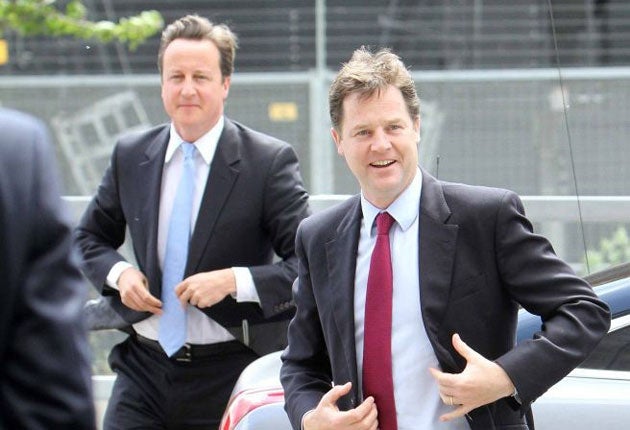Andrew Grice: Progressive majority may find its voice despite AV disaster
Inside Westminster

On the eve of the referendum on the electoral system, Ed Miliband said supporting the alternative vote (AV) would give expression to the "anti-Conservative, progressive majority" in Britain. On the face of it, he could not have been more wrong.
A mere 10 counting areas out of 440 in the UK voted in favour of AV: the London boroughs of Islington, Camden, Haringey, Hackney, Lambeth and Southwark; Oxford; Cambridge; Edinburgh Central; and Glasgow Kelvin.
The Conservatives are gloating: the much-vaunted progressive majority turned out to be a tiny progressive minority. Grumpy Tory MPs are suddenly happy bunnies, convinced the referendum and English council results put David Cameron on course to win the next general election. You can hardly blame the Tories for dancing on the grave of the progressive majority. It was Tony Blair who, under the influence of his mentor Roy Jenkins, set out the goal of making the 21st century one of "progressive politics after one dominated by Conservatives". Mr Blair was serious about formalising a "progressive alliance" through a merger with the Liberal Democrats but left Paddy Ashdown waiting at the altar when he won a landslide in 1997. A year later he jilted Lord Jenkins by shelving his proposals for "AV plus" – constituency MPs topped up by a smaller number in proportion to the votes cast in each region.
Winning a referendum was much harder this year. The No campaign used the threat of a progressive alliance aimed at keeping the Conservatives out of power to get Tory supporters out in droves – the main reason why Mr Cameron's party made remarkable gains in the council elections.
Yet the Tory celebrations might be premature. This year was about the worst time for a referendum on the voting system. Instead of uniting the anti-Conservative forces, centre-left voters were divided. Many could not resist the temptation to kick Nick Clegg. With his party split, Ed Miliband felt unable to share a platform with the unpopular Mr Clegg – hardly a good advert for the progressive movement.
The optimists insist the "Clegg factor" was a one-off. They say the personal attacks on Mr Clegg by the Conservative-led No campaign have reminded the Lib Dem leader that the Tories are a ruthless, tribal enemy. "The scales have fallen from his eyes," said one Liberal Democrat minister.
In a speech this week, Mr Clegg dismissed as "nonsensical and naive" the "centre-right realignment" talked up by some Tories since the Coalition was formed. "Realignment is a polite euphemism used by one party that wants to gang up on the other gang – with us as a temporary recruit," he said.
Although he was equally scornful about an anti-Tory alliance, the many Lib Dems who believe their party has more in common with Labour than the Tories find some crumbs of comfort in the AV disaster. They regard Mr Clegg and his close allies as a clique who seized control of the party and who will now have to listen to its "social democratic heartbeat".
Behind the scenes, relations between senior Labour and Lib Dem figures are warmer than you would expect. They work closely together in the House of Lords, notably over the Government's NHS reforms. I am told Mr Clegg would have "given his right arm" to have gone into coalition with Labour in the Scottish Parliament if the election result had been different, as it would have shown voters his party had not become a mere adjunct of the Tories.
Last week's results were not good enough for Labour. In the council elections, it garnered Lib Dem defectors in the north but its disastrous defeat in Scotland was a stark warning that it cannot take anti-Clegg votes for granted. Labour did not do well enough in the south of England, fuelling the grumbling from those inside the party who want Mr Miliband to target the Tories rather than woo Lib Dem supporters. However, he reassured the doubters at a Shadow Cabinet meeting on Tuesday, insisting he recognised the need to take votes from both other parties.
Mr Cameron's performance may convince voters to give him an outright majority next time. But he still has a lot to do. After all, 52 per cent backed two parties opposed to immediate spending cuts, while the Tories managed only 36 per cent against a clapped-out Labour Party with an unelectable leader. It is not impossible the Lib Dems will again hold the balance of power next time. The cause of those who hope Britain's progressive majority will assert itself is not yet lost.

Join our commenting forum
Join thought-provoking conversations, follow other Independent readers and see their replies